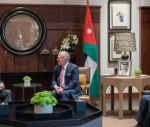You are here
A Sunni-Shiite bridge too far
May 10,2014 - Last updated at May 10,2014
Iraq’s recent parliamentary election, the first since United States troops left the country in 2011, was held amid a rising tide of violence that is fast approaching the levels experienced during the 2005-2007 insurgency.
Can the new government restore order and address the many immense challenges that Iraq faces?
The challenges are indeed daunting. The authorities must resolve fundamental constitutional questions (such as whether Iraq should be a federal state or a confederation), rebuild civil society, reform state institutions, reconstruct the economy, and end the waste and corruption in the oil sector.
But perhaps the most intractable challenge of all is bridging the sectarian rift between the country’s Shiite and Sunni citizens. These fissures are mirrored in other Arab countries (such as Syria, Lebanon, the Gulf countries and Yemen) and, increasingly, in the wider Muslim world (including Pakistan, Malaysia and Indonesia).
Is this a historical aberration, or are Islam’s two largest sects condemned to perpetual mutual hostility?
Certainly, there were periods when the two communities coexisted peacefully. But what matters today is that Shiites and Sunnis relate to their past differently, and that this historical memory can be distorted — and even invented — to create mistrust and hate.
The overthrow of the first Muslim dynasty, the staunchly anti-Shiite Umayyads, in the year 750, by the Abbasids, who traced their lineage to the Prophet Mohammad’s uncle, raised hopes, albeit short lived, of a Sunni-Shiite rapprochement.
The 500 years of Abbasid reign that followed provide many valuable illustrations of how these two communities subsequently related to each other.
In particular, there is much to be learned from the different legacies of the caliph Al Nasir (1180-1225) and the last Abbasid caliph, Al Musta’sim (1242-1258).
The rule of Al Nasir — who viewed the Shiite as an intrinsic part of the Islamic community and sought to treat all of his subjects equally — was characterised by a marked decrease in sectarian tensions.
By contrast, Sunni-Shiite clashes — including killings, arson and other violence — were common during Al Musta’sim’s rule.
These examples demonstrate the importance of good leadership when communities that uphold different claims to the truth are subject to the same political authority — especially when these communities seek assurance that their survival is not threatened.
Iraq’s current political leaders need to learn from this past and ensure that none of the country’s communities faces marginalisation or discrimination — lessons that apply throughout the Muslim world.
In Pakistan, for example, there are sectarian killings almost daily; in Malaysia, the tiny Shiite population is viewed as an existential threat; and incendiary language dominates discourse about rival sects in Wahhabi circles in Saudi Arabia and far beyond.
Politics and power struggles explain much of the violence and mistrust.
Fear of Iranian-led hegemony, for example, has focused Gulf leaders’ minds on their Shiite population’s loyalty.
Malaysia’s political parties use anti-Shiite animus to spread fear, helping to attract votes and consolidate power.
Syria and its regional allies are determined to protect a new regional balance of power that shifted in their favour following the US-led invasion of Iraq. But political calculation cannot explain everything.
The fall of Saddam Hussein in 2003 provides a good example of how a political event, viewed through a sectarian lens, can be interpreted differently.
The US destruction of the Iraqi state brought about a precarious new order that sought to redress years of Sunni dominance by favouring the Shiite. However, the shock of sudden Sunni disempowerment generated a discourse, widely shared in the Muslim world, in which the Shiites are guilty of collusion in the US occupation of the country — a view reinforced by events in Syria.
According to this thesis, the Shiites simply reverted to their “historic” role as wreckers and fifth columnists.
Was it not the case, it is claimed, that the Shiites also colluded with the Mongols in the fall of Baghdad in 1258, culminating in the death of the last Abbasid caliph and the destruction of the Abbasid Empire, the “universal state” of Muslims?
Several mediaeval Muslim historians pointed to the role of the Shiite vizier Ibn Al ‘Alqami, arguing that he plotted with the Mongols to bring down the caliphate.
Once the preserve of a handful of scholars, the Ibn Al ‘Alqami story now plays a prominent part in today’s Sunni- Shiite disputes.
Indeed, “‘Alaqima”, the plural form of the Arabic name Alqami, is now applied to the Shiites as shorthand for treachery.
Social media forums are replete with polemics about the Shiite role in assisting both Mongol and US invaders.
Many even claim that Iraq’s Shiites are Al ‘Alqami’s descendants, and that Nouri Al Maliki, Iraq’s prime minister, is his modern incarnation.
These diatribes reflect Iraqi’s polarised historical memory.
Despite ample historical evidence of peaceful inter-communal relations, many people — whether through simple ignorance of history or the need to assert the supremacy of one version of the truth — prefer to consecrate narratives of treachery and betrayal that perpetuate hatred.
More important, the current situation reflects a lack of wisdom, responsibility and basic decency on the part of political and religious leaders, who prefer to fuel, rather than dampen, inter-communal strife. Sadly, intolerance has now become a generalised condition.
There is too little knowledge about other communities’ beliefs and history, and what little exists has been overwhelmed by sectarian anger and its poisonous rhetoric.
As long as Sunnis and Shiites refuse to think about their past together, it is difficult to foresee a tranquil future together. And if political and religious leaders are unable or unwilling to seek accommodation, it will be up to like-minded individuals, groups and civil-society institutions to rebuild mutual respect and find ways to cooperate.
Doing so will require knowledge, patience and, above all, open minds and hearts.
Ali A. Allawi, Iraq’s minister of trade and minister of defence (2003-2004), is research professor, Middle East Institute, National University of Singapore. His most recent book is “Faisal I of Iraq”. Nassima Neggaz is a post-doctoral research fellow at the Middle East Institute, National University of Singapore. ©Project Syndicate, 2014. www.project-syndicate.org












